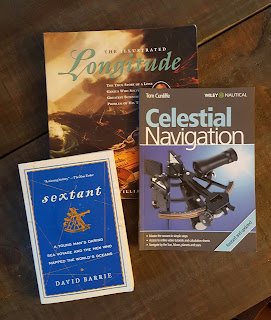It's an entire book now, albeit one which is not in its final form. I squeezed fifty-odd pages of notes into fifteen, at least of half of which I hope to find a place for in the final draft. (As bad as that sounds, the original "notes" document was a staggering 115 pages.) And there still a couple of spots with blue lettering--so I can't miss it--saying things like "Insert accurate nautical terminology here!" The historical aspects of The Stowaway mean that I can never learn too much.
I'm reading the manuscript out loud (to the delight or chagrin, I'm not sure which) of the feral foster cat who is my audience. I've read that writing fiction on a computer short-circuits some of the processes that handwriting facilitates. I don't know the truth of that, but I do know that repetitive stress injuries and bad handwriting (I blame grad school, because it was fine before that) mean that I will never write a book long-hand. But reading aloud seems like it may accomplish some of the same aims.
It's my preferred method of finding words I overuse (ahem), sentences that don't flow, bits that don't fit with other bits. This method is harder and creates more work than the other revisions I've done, and I can't say it's my favorite part of writing. I do, however, appreciate the results.
Before I can call The Stowaway a finished work, I want to make sure I have enough understanding celestial navigation to be able to write Vivian Drew's experience of learning it. Trigonometry was the only math class I ever enjoyed, but that was long enough ago that its tenets are no longer at my ready retrieval. I've learned how to read a sextant, but there's far more to the art and science of navigation than that.
I am also immersing myself in relevant works so that I'm living the narrative as much as I can while I complete the manuscript.
I will also make time for DVD watching, so images of faraway places are clear in my mind. (Maybe Robert Newton's Long John Silver isn't so good for research. But it was a lucky thrift-store find, and does fit with the general immersion theme.)
My beta readers are ready. I have a background in non-profit grant-writing that I plan to turn towards synopsis and query letters.
And then I run up the sail and strike out for distant shores.






Robert E. Howard, who (whatever else he might have been) was one of the greatest prose stylists of the 20th century, was another one who would read his work out loud in order to get the sound right.
ReplyDeleteIf you're interested, I've found another book on writing fight scenes (I presume that you might find use of it in your re-writing phase), which so far seems more practically useful than the Teel James Glenn book. It's called Writing Fight Scenes by Rayne Hall.
Also, I have a few books on pirates, if you want to check my collection for ones you might not have seen just drop me an email.
It works. I'm appalled at how much I'm finding to fix.
DeleteI have that book, in fact. It's been helpful. And I follow the author on Twitter. :-) I am interested in your pirate collection, so expect an email.
I am so looking forward to your book being published.
ReplyDeleteHave a Captain and friend. ;)
http://kittyhooks.deviantart.com/art/The-Captain-and-his-Mate-609350516
*grin* I'm glad! (And I'm adding your art to my desktop wallpaper.)
Delete